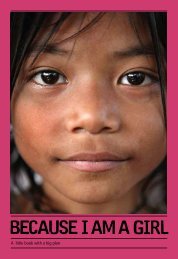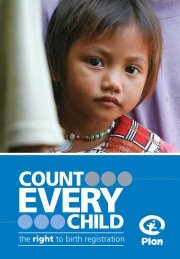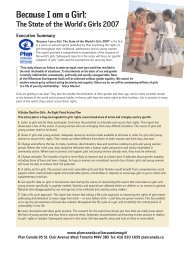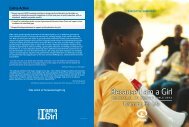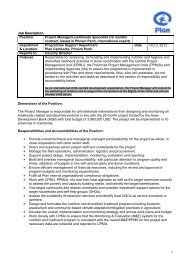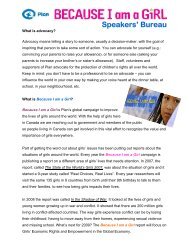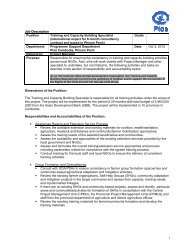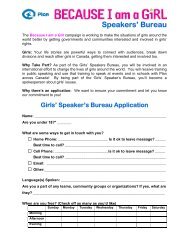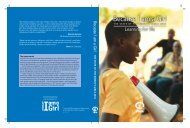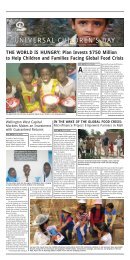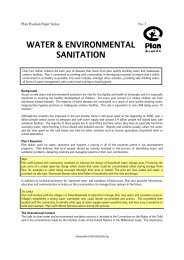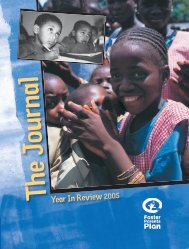Plan Worldwide Annual Review and Combined Financial ...
Plan Worldwide Annual Review and Combined Financial ...
Plan Worldwide Annual Review and Combined Financial ...
You also want an ePaper? Increase the reach of your titles
YUMPU automatically turns print PDFs into web optimized ePapers that Google loves.
Learn Without Fear<br />
One of the main obstacles to education in developing countries is fear – fear of punishment,<br />
of abuse <strong>and</strong> fear of sexual harassment or violence. <strong>Plan</strong>’s groundbreaking global campaign<br />
Learn Without Fear has propelled us into a leading role among organisations working to<br />
ensure that fear is no longer an obstacle to learning for any child, anywhere.<br />
<strong>Plan</strong>’s approach has brought exceptional results:<br />
• 485 million children are now better protected from violence in schools –<br />
<strong>Plan</strong> Learn Without Fear campaigners have helped improve legal frameworks in 13 countries.<br />
For example, the constitutions of Ecuador, Kenya <strong>and</strong> South Sudan now specify that it is the<br />
government’s responsibility to protect children from violence in schools.<br />
• <strong>Plan</strong> has become an international NGO expert in preventing violence in schools –<br />
We are frequently asked to present our work at a wide range of events, including UN<br />
expert meetings, the International Bullying Prevention Association Conference <strong>and</strong> the<br />
World Congress on Violence in Schools.<br />
Although the global campaign is ending, regional <strong>and</strong> country offices will continue these activities<br />
when they are appropriate to their plans <strong>and</strong> needs. For example, in Latin America we recently<br />
launched a partnership with cable television network Cartoon Network to tackle school bullying.<br />
And at the global level, <strong>Plan</strong> is contributing to reports on violence in schools by UNESCO, the<br />
Inter-American Development Bank, the University of Oxford, Child Helpline International <strong>and</strong><br />
the UN Secretary General’s Special Representative on Violence Against Children, among others.<br />
Count Every Child<br />
Globally, 51 million children are vulnerable because their birth has not<br />
been registered. Unregistered children can easily be denied their rights to<br />
protection, as well as to essential services such as healthcare <strong>and</strong> education.<br />
The universal birth registration programme Count Every Child puts <strong>Plan</strong> at<br />
the forefront of global efforts to ensure every child is counted.<br />
<strong>Plan</strong> advocates for improved birth registration policies <strong>and</strong> practices,<br />
<strong>and</strong> for adequate resources to be allocated to them. We also encourage<br />
governments to take advantage of advances in information technology<br />
to improve registration systems. In March 2012, birth registration made<br />
it to the top of United Nations agenda following successful advocacy<br />
efforts led by <strong>Plan</strong>’s UN Liaison <strong>and</strong> Advocacy Office in Geneva. The UN<br />
Human Rights Council unanimously adopted a resolution calling upon<br />
all states to ensure birth registration for all <strong>and</strong> the right of everyone to<br />
recognition before the law. <strong>Plan</strong> played a key role in the drafting of the<br />
resolution <strong>and</strong> ensuring its strong language.<br />
We are working with parents <strong>and</strong> caregivers to improve knowledge <strong>and</strong><br />
practices relating to birth registration as well as integrating registration<br />
into <strong>Plan</strong> programme areas such as early childhood care <strong>and</strong> development.<br />
We are also using innovative approaches such as birth notifications<br />
through mobile phones in Kenya. Using lessons learned from Kenya <strong>and</strong><br />
other similar projects, <strong>Plan</strong> has worked with mobile phone operators,<br />
government representatives <strong>and</strong> key development agencies to develop<br />
the Identity at Birth concept (see below).<br />
CAMPAIGNS<br />
Identity at Birth – creating digital identities<br />
through mobile phones<br />
The Identity at Birth model uses mobile phones to register births in the<br />
local community through a decentralised network of trusted agents.<br />
It sends birth identities to a database within national registration<br />
systems, helping governments register the most marginalised<br />
<strong>and</strong> achieve their e-governance goals. While the system<br />
improves the process of issuing paper birth certificates,<br />
it also creates a digital identity for the child on the<br />
caregiver’s phone that can be used to access key<br />
services such as health care <strong>and</strong> education.<br />
© <strong>Plan</strong><br />
13



